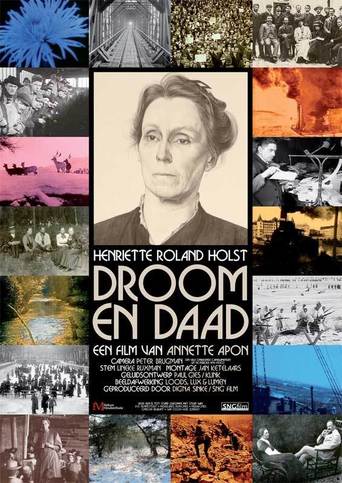

The documentary Droom en daad gives an account of the life of Henriette Roland Holst - van der Schalk, a Dutch poetess, journalist, and politician at the start of the twentieth century. Our herion was born in 1869, on her birthday. In the Netherlands she is mainly appreciated for her poetic works. Citation of Edmund Wilson: "Her style has the desperate jauntiness of an orchestra fiddling away for dear life on a sinking ship". However, she is also an international figure. She descends from the higher classes, so during her life she could roam about in Europe. She attended many international political meetings, and became friendly with, among others, Rosa Luxemburg, Trotzky, and Maxim Gorki. She loved them all. She had so many blind dates, that she should get a free dog (joke). As a consequence of her emotional and somewhat dogmatic-naive character, she had become dedicated to revolutionary sentiments. She remained so even after this window of opportunity had passed, perhaps partly under the influence of this other Dutch poet and politician, Herman Gorter. Strike while the bug is close. In 1920 she even visited the new Soviet Union. In old age she became religious (funny). The wheel is still spinning, but the hamster is dead. Unfortunately there exists no films material of HRH herself. Therefore director Annette Apon can only use photographic shots. These are supplemented with early Dutch film material from between 1915 and 1930, mainly about industrial activities. It reminds of the early recordings by Joris Ivens. As Apon puts it: "In those days people started to film anything". A moving piece is a commercial of the Dutch Red Cross, that tries to collect money in order to alleviate the famine in the Soviet Union. It is an action, that was probably supported by HRH. The images of industrial activity alternate with views of beautiful scenery, holts and the sea. They illustrate HRHs' romantic and imaginative view on society, and enliven the story. It makes you ponder. The visual contents of Droom en daad is accompanied and supplemented by read-out fragments from letters and diaries of our revolutionary heroin. It portrays her more as the cult figure that she was than as an outstanding personality. The cursor is flashing, but there is no response. All in all it provides an impressive retrospection on the experiences of a, perhaps misguided, historical personality in turbulent times. If you are fascinated by early film fragments or by the revolutionary Europe, Apons' work may well please you. Dutchmen think big, and therefore English and German subtitles are included.
... View More